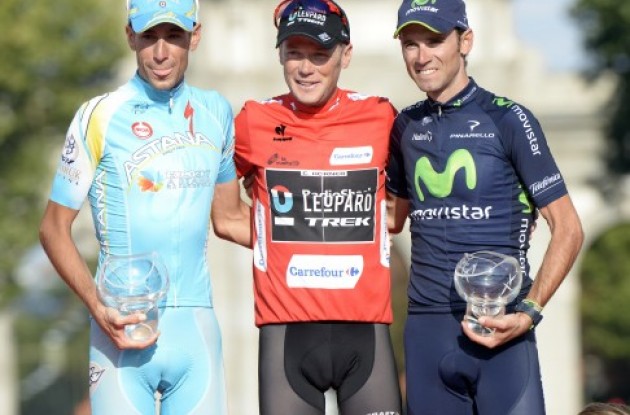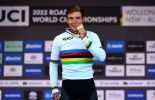2014 Vuelta a Espana Preview and Predictions
In recent years, the Giro d’Italia and the Vuelta a Espana have gained reputations for being about as competitive as the Tour de France. The Vuelta, with its combination of high mountain stages and intense racing, has persuaded some that it can be at least the equal of La Grande Boucle. The 2014 Vuelta a Espana might be a comedown for some, with this year’s race having eight mountain stages as opposed to 12 last year. The race, however, will be 3,239.9 km long, and will include two individual time trials, a team time trial, five hill stages, and five flat stages. The winner will be a tough, complete rider.
The race will begin with a 12.6-km team time trial in Jerez de la Frontera. Stages 2 through 5 will combine flat and hill stages, with Stage 6 being the race’s first mountain stage. Stages 6 through 9 will be a combination of hilly and mountain stages, with the race’s first rest day following Stage 9.
The Vuelta’s second week will begin with the race’s first individual time trial, a 36.7-km affair from Real Monasterio de Santa María de Veruela to Borja. Four of the following six stages will be mountainous, with an additional one being hilly. Only one flat stage will give the sprinters a chance to shine during the second week, which will end after Stage 15 on Monday, September 8. The second rest day will follow this stage.
The Vuelta’s final five days will be hotly contested. Stage 17 will be flat, but Stages 18 and 20 will be mountainous, and Stage 19 will be hilly. The race’s final two mountain stages will be decisive in the event of a close race. Stage 21, a 9.7-km time trial in Santiago de Compostela, the end of the pilgrimage known as the Way of St. James, will conclude the 2014 Vuelta. The time trial will probably be too short to be decisive, but the riders will not be able to relax until they have crossed the finish line.
Since the Vuelta was moved from April to September in 1995, it has become a chance for redemption for riders whose seasons have been disappointing. It has also become a tuneup race for the world championships, which often start a week after the Vuelta ends. Consequently, the race has drawn strong fields. This year’s field might be the strongest in the nearly 20 years since the Vuelta changed its place on the racing calendar. Chris Froome (Sky) and two-time Vuelta champion Alberto Contador (Tinkoff-Saxo Bank), both of whom crashed out of the Tour de France, will ride the race, as will Giro d’Italia champion Nairo Quintana (Movistar) and Joaquim Rodriguez (Katusha), the latter of whom has had a crash-marred season. Defending champion Chris Horner (Lampre-Merida) was hit by a car and badly injured in April 2014 but finished 17th in the Tour and second in the Tour of Utah. Dan Martin and Andrew Talansky (both from Garmin-Sharp) abandoned the Giro and the Tour, respectively, and want to redeem themselves.
Who will win the Vuelta? Two men go to the head of the class. They are Froome and Quintana. Froome is an excellent climber and time trialist, but he has said that he is unsure about his form because of his post-Tour abandonment layoff. Quintana had a long post-Giro layoff, but he won last week’s Vuelta a Burgos. The Colombian is not a strong a time trialist as Froome, but he can more than hold his own in the mountains. The race between the two is too close to call.
Behind Froome and Quintana, a sizable group of riders will vie for podium places and high finishes. Among these will be Horner. The American’s form is returning, and he should be a force to be reckoned with in the mountains. This year’s field, however, is deeper than last year’s, and the Lampre-Merida man’s admitted weakness against the clock will work against him. He will be competitive, but a second victory is probably too much to expect.
Rigoberto Uran (Omega Pharma-Quick Step) can climb and time trial. The Colombian showed that he could do both at this year’s Giro, staying with everyone but Quintana in the mountains and winning the Stage 12 time trial. Uran will not win, but he will stay at or near the front of the race, and his well-rounded riding could put him on the podium.
Alejandro Valverde (Movistar) will, along with Quintana, be cocaptain of Movistar. The Spanish veteran has 11 top 10 placings in grand tours, including a victory in the 2009 Vuelta. He climbs consistently, which keeps him among the best in three-week races. Quintana will overshadow the Spaniard, however, and Valverde probably will not time trial well enough to get on the podium. A top five finish is not unrealistic for the Movistar man, though.
Last year, Thibaut Pinot (FDJ.fr) finished seventh in the Vuelta. This year, he has finished third in the Tour de France. The Frenchman has said that he wants to win a stage of this year’s Vuelta. Pinot is fit, and he is confident. The one thing that could keep him off of the podium is his time trialing. However, this race should take him up another rung of the cycling ladder.
Garmin-Sharp will bring the triumvirate of Ryder Hesjedal, Dan Martin, and Andrew Talansky to the Vuelta. Hesjedal finished ninth in this year’s Giro and 25th in the Dauphine Libere in support of Talansky, who won the race. He has since returned to racing in the Tour of Poland, where he showed good form, finishing 17th overall. Martin crashed out of last year’s Vuelta, crashed out of contention at Liege-Bastogne-Liege, and crashed out of the Giro. Talansky abandoned the Tour after injuring his back in a crash. The trio can have an impact on the race, but staying rubber side down will be important.
Joaquim Rodriguez (Katusha) is seeking his first grand tour win. He probably will not get it in this year’s Vuelta. He can climb well enough to place well, but he will lose at least 60 seconds in the first time trial. Rodriguez can realistically aspire to win at least one stage and to take the climber’s jersey. A top five finish is not out of the question for him.
Cadel Evans’s (BMC) days of being a serious contender in grand tours are over. In this year’s Giro, the Australian lost steam during the second half of the race. He can take the overall lead for a time and perhaps win stages, but Evans no longer has the endurance to be at or near the front for three weeks. A top 10 finish is realistic for him.
One rider is a wild card. He is Alberto Contador. The Spaniard broke his tibia in the Tour de France after having a superb early season. He had a layoff and has said that he is just reaching the point at which he can climb without pain. Contador feels that the general classification is out of the question but that he might be able to win a stage and sharpen himself for next season. I share his view that a top 10 finish is more than he can hope for.
Other riders to watch are Wilco Kelderman (Belkin), who finished seventh in this year’s Giro and fourth in the Dauphine Libere; Warren Barguil (Giant-Shimano), who won two stages of last year’s Vuelta; and Jurgen Van Den Broeck (Lotto-Belisol).
Follow the 2014 Vuelta a Espana at www.roadcycling.com and keep track of these riders and others!








